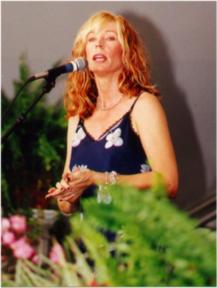Related Research Articles

Dolly Rebecca Parton is an American singer, songwriter, actress, and philanthropist, known primarily for her decades-long career in country music. After achieving success as a songwriter for others, Parton made her album debut in 1967 with Hello, I'm Dolly, which led to success during the remainder of the 1960s, before her sales and chart peak arrived during the 1970s and continued into the 1980s. Some of Parton's albums in the 1990s did not sell as well, but she achieved commercial success again in the new millennium and has released albums on various independent labels since 2000, including her own label, Dolly Records.

"Tainted Love" is a song composed by Ed Cobb, formerly of American group the Four Preps, which was originally recorded by Gloria Jones in 1964. In 1981, the song attained worldwide fame after being covered and reworked by British synth-pop duo Soft Cell. The song has since been covered by numerous groups and artists.

Juice Newton is an American pop and country singer, songwriter, and musician. Newton has received five Grammy Award nominations in the Pop and Country Best Female Vocalist categories – winning once in 1983 – as well as an ACM Award for Top New Female Artist and two consecutive Billboard Female Album Artist of the Year awards. Newton's other awards include a People's Choice Award for "Best Female Vocalist" and the Australian Music Media's "Number One International Country Artist".

"I Will Always Love You" is a song written and originally recorded in 1973 by American singer-songwriter Dolly Parton. Written as a farewell to her business partner and mentor Porter Wagoner, expressing Parton's decision to pursue a solo career, the country single was released in 1974. The song was a commercial success for Parton, twice reaching the top spot of the US Billboard Hot Country Songs chart: first in June 1974, then again in October 1982, with a re-recording for The Best Little Whorehouse in Texas soundtrack.

"Islands in the Stream" is a song written by the Bee Gees and recorded by American country music artists Kenny Rogers and Dolly Parton. It was released in August 1983 as the first single from Rogers's fifteenth studio album Eyes That See in the Dark. The Bee Gees released a live version in 1998 and a studio version in 2001.
Country pop is a fusion genre of country music and pop music that was developed by members of the country genre out of a desire to reach a larger, mainstream audience. Country pop music blends genres like rock, pop, and country, continuing similar efforts that began in the late 1950s, known originally as the Nashville sound and later on as Countrypolitan. By the mid-1970s, many country artists were transitioning to the pop-country sound, which led to some records charting high on the mainstream top 40 and the Billboard country chart. In turn, many pop and easy listening artists crossed over to country charts during this time. After declining in popularity during the neotraditional movement of the 1980s, country pop had a comeback in the 1990s with a sound that drew more heavily on pop rock and adult contemporary. In the 2010s, country pop metamorphosized again with the addition of hip-hop beats and rap-style phrasing.

Jolene is the thirteenth solo studio album by American entertainer Dolly Parton. It was released on February 4, 1974, by RCA Victor. The title track, "Jolene", tells the tale of a housewife confronting a beautiful seductress who she believes is having an affair with her husband. It became Parton's second solo number-one country single; it also was a moderate pop hit for her, and also did well in the United Kingdom. Since the introduction of downloads to the Official Chart in 2005, it has amassed 255,300 downloads and 6.68 million streams. It has been covered by numerous performers.

Heartbreaker is the twentieth solo studio album by American singer-songwriter Dolly Parton. It was released on July 17, 1978, by RCA Victor. The album was produced by Gary Klein and Parton with Charles Koppelman serving as executive producer, and was an even more direct aim at the pop charts, with several of its songs verging on disco. The album topped the Billboard Top Country Albums chart for nine consecutive weeks and peaked at number 27 on the Billboard 200. The album produced two number one hits on the Billboard Hot Country Songs chart, "Heartbreaker" and "I Really Got the Feeling", while "Baby I'm Burnin'" peaked at number 25 on the Billboard Hot 100. The album has been certified Gold in the United States and Canada.

The Best Little Whorehouse in Texas original soundtrack was released along with the film in July 1982. The album was produced by Gregg Perry.

Greatest Hits is a compilation album by the American singer and songwriter Dolly Parton, released in September 1982. It focused mostly on her late 1970s pop hits. The original track list was revised a year later to include Parton's 1983 duet hit with Kenny Rogers, "Islands in the Stream". The album has since been reissued with an abbreviated track listing. The 1983 version was re-released on iTunes April 10, 2020.

The Grass Is Blue is the thirty-seventh solo studio album by American singer-songwriter Dolly Parton. It was released on October 26, 1999, by Sugar Hill and Blue Eye Records. The album won a Grammy for Best Bluegrass Album and "Travelin' Prayer" was nominated for Best Female Country Vocal Performance.

Little Sparrow is the thirty-eighth solo studio album by American singer-songwriter Dolly Parton. It was released on January 23, 2001, by Sugar Hill and Blue Eye Records. The album received a Grammy nomination for Best Bluegrass Album and "Shine" won Best Female Country Vocal Performance. The album is dedicated to Parton's father, Lee Parton, who died in November 2000.

Wouter André "Wally" De Backer, known professionally as Gotye, is a Belgian-born Australian singer-songwriter and multi-instrumentalist. He is known for his 2011 single "Somebody That I Used to Know", featuring New Zealander musician Kimbra, which reached number one on the Billboard Hot 100 and became the best-selling song of 2012. He has won five ARIA Awards and received a nomination for an MTV EMA for Best Asia and Pacific Act. On 10 February 2013, he won three Grammy Awards at the 55th Annual Grammy Awards Show: Record of the Year and Best Pop Duo/Group Performance for "Somebody That I Used to Know" and Best Alternative Music Album for Making Mirrors.

"Jolene" is a song written and recorded by American country music artist Dolly Parton. It was produced by Bob Ferguson and recorded at RCA Studio B in Nashville, Tennessee on May 22, 1973, then released in October 1973, by RCA Victor as the first single and title track from her album of the same name.

"Here You Come Again" is a song written by Barry Mann and Cynthia Weil, and recorded by American entertainer Dolly Parton. It was released as a single in September 1977 as the title track from Parton's album of the same name, topped the U.S. country singles chart for five weeks, and was nominated for the 1978 Grammy award for Best Female Pop Vocal Performance; it also reached number three on the U.S. Billboard Hot 100, representing Parton's first significant pop crossover hit.

The Backwoods Barbie Tour was the ninth headlining concert tour by American recording artist, Dolly Parton. Visiting the United States, Northern Europe and Canada, the tour supported her 42nd studio album, Backwoods Barbie. The tour was well received by critics and spectators alike, earning more than nine million dollars in 2008. The European leg of the tour was the most successful outing of Parton's touring history, performing for 170,000 spectators in the United Kingdom, Sweden, Denmark, Norway and the Netherlands. The tour was expected to reach Australia as well but this did not come to fruition.

Kimbra Lee Johnson, known mononymously as Kimbra, is a New Zealand singer and songwriter. Known for mixing pop with R&B, jazz and rock musical elements, her accolades include four ARIA Music Awards, two Grammy Awards and seven New Zealand Music Awards.

The singles discography of American country singer-songwriter Dolly Parton includes over 200 singles and touches on eight decades. Parton has released 198 singles as a lead artist, 49 as a featured artist, six promotional single and 68 music videos. Parton also released 21 singles with Porter Wagoner from 1968 to 1980, bringing her total number of singles to 243.

"Somebody That I Used to Know" is a song written, produced and performed by Belgian-Australian musician and singer Gotye, featuring vocals from New Zealand singer Kimbra. The song samples Luiz Bonfá's 1967 instrumental song "Seville", with additional instrumentations of beats and a xylophone playing a melody based on "Baa, Baa, Black Sheep". The song was released in Australia and New Zealand through Eleven Music on 5 July 2011 as the second single from Gotye's third studio album, Making Mirrors (2011). It was later released by Universal Music in December 2011 in the United Kingdom, and 20 January 2012 in Ireland and the United States. "Somebody That I Used to Know" was written and recorded by Gotye at his parents' house on the Mornington Peninsula in Victoria, Australia, and is lyrically related to the experiences he has had with romantic relationships.
"Do I Ever Cross Your Mind" is a song by American singer-songwriter Dolly Parton. The song was written by Parton and was first released as a duet with Chet Atkins on his 1976 album, The Best of Chet Atkins & Friends. Parton performed the song live throughout the 1970s, but did not release a solo version until 1982 on Heartbreak Express. Parton's solo version was released as the album's third single in July 1982, a double A-side release with "I Will Always Love You" from The Best Little Whorehouse in Texas soundtrack. The song did not chart on its own, but did chart as the flip-side of "I Will Always Love You" throughout the single's chart run on the Billboard Hot Country Songs chart. Parton would record the song for a third time in 1994, this time with Emmylou Harris and Linda Ronstadt. This version would be released on the 1999 album Trio II, and would be one of three singles released simultaneously from the album.
References
- ↑ "The 30-Day Song Selection Spectacular: #4, Favorite Breakup Song". American Songwriter. 3 June 2011. Retrieved 14 June 2012.
- 1 2 Dailey, Hannah (8 February 2024). "75 Best Breakup Songs of All Time". Billboard .
- ↑ Phil Collins, Not Dead Yet: The Memoir (2016), p. 186.
- ↑ "Tainted Love — Songlexikon". Songlexikon.de. Retrieved 25 July 2013.
- ↑ William Ruhlmann. "Non-Stop Erotic Cabaret review at Allmusic". AllMusic . Rovi Corporation . Retrieved 24 June 2013. "the remake of Gloria Jones' "Tainted Love," which dominated dance clubs and eventually peaked in the pop Top Ten with its synth-pop sound and Almond's plaintive vocal in 1981–1982."
- ↑ Tim Sendra. "Pop & Wave, Vol. 1 review at Allmusic". AllMusic . Rovi Corporation . Retrieved 24 June 2013. "the collection has some of the biggest hits of the new wave era. Songs like "Cars" by Gary Numan, "Tainted Love" by Soft Cell (...) are the type of tunes that define the era."
- ↑ Garfield, Bob (31 January 2012). "'I Will Survive': the ridiculous and the sublime". The Guardian . Retrieved 19 September 2013.
- ↑ Cyrus Goes Triple-Platinum; Brooks Breaks 8 million. Billboard. 15 August 1992. Retrieved 5 August 2010.
- ↑ Spanos, Brittany (16 June 2016). "Ex-Factor: Taylor Swift's Best Songs About Former Boyfriends". Rolling Stone .
- ↑ Rikky Rooksby, Inside Classic Rock Tracks: Songwriting and Recording Secrets of 100 Great Songs, from 1960 to the Present Day (2001), p. 31.
- 1 2 Sheila Davis, The Songwriter's Idea Book (Penguin Group, 1992), "Strategy Twenty-Seven: Breaking Up as Plot Device".
- ↑ Staff, The Ringer (14 February 2020). "The 50 Greatest Breakup Songs of All Time". The Ringer.
- ↑ "The 50 best breakup songs ever". Time Out Worldwide. 12 August 2022.
- ↑ Geller, Wendy (21 February 2014). "It Was 40 Years Ago: Dolly Parton Bids Adieu to Porter Wagoner, Writes 'I Will Always Love You'". Yahoo! Music. Archived from the original on 23 July 2015. Retrieved 31 July 2015.
- 1 2 "I Will Always Love You by Dolly Parton Songfacts". www.songfacts.com. Retrieved 12 November 2016.
- ↑ "Dolly Parton remembers writing 'I Will Always Love You'". The Tennessean. Retrieved 12 November 2016.
- ↑ Pitt, Ivan L. (2010). Economic Analysis of Music Copyright: Income, Media and Performances. Springer. p. 125. ISBN 978-1-4419-6317-8.
- ↑ Ahmed, Insanul (5 August 2010). "Complex Presents: The 25 Greatest Auto-Tune Songs". Complex . Retrieved 17 January 2016.
- ↑ "George Michael's highs and lows". BBC News Online. 21 September 2008. Retrieved 20 November 2010.
- ↑ "Ke$ha, The Black Eyed Peas and Adele Top the Charts for Most Revenue Made via Digital Downloads in Over a Decade" (Press release). PR Newswire. 7 April 2014. Retrieved 31 July 2015.
- ↑ Brandle, Lars (30 November 2012). "Gotye, Kimbra Win Big at ARIA Awards". Billboard. Retrieved 29 December 2012.
- ↑ "Global Music Report 2016: State of the Industry" (PDF). International Federation of the Phonographic Industry. Archived from the original (PDF) on 30 July 2016. Retrieved 16 April 2016.
- ↑ "Global Music Report 2017: Annual State of the Industry" (PDF). International Federation of the Phonographic Industry. Archived from the original (PDF) on 26 April 2017. Retrieved 25 April 2017.